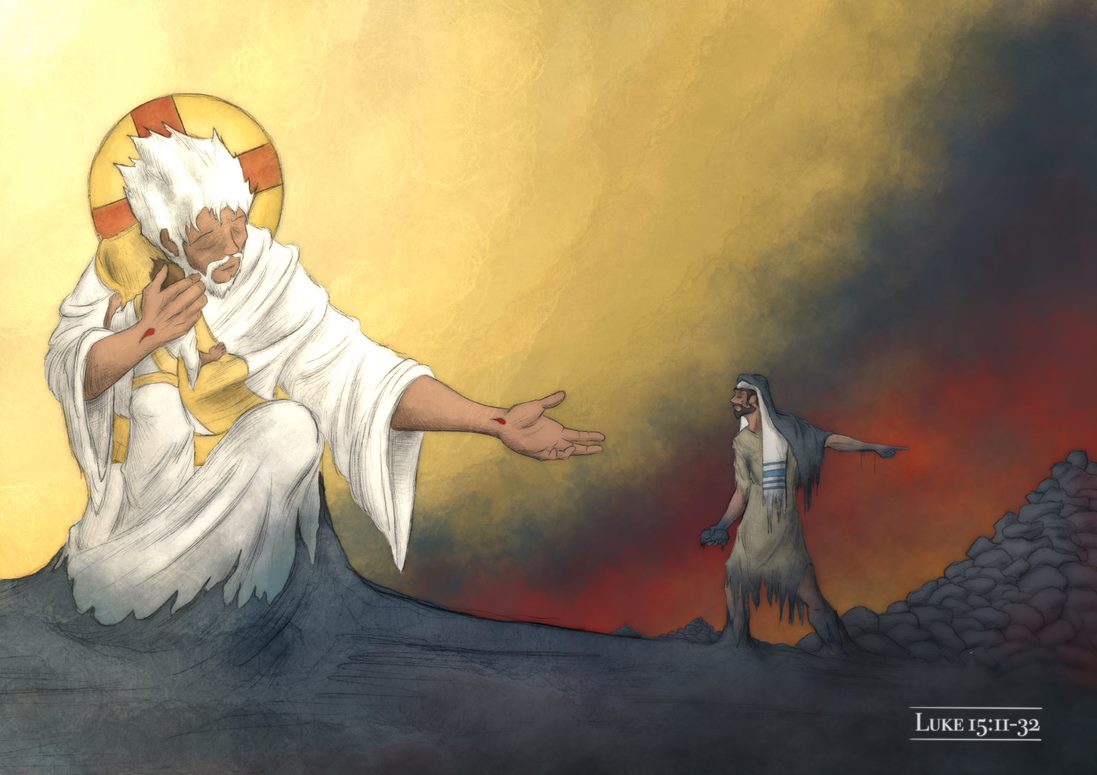In Luke 15, Jesus told a powerful story about two sons—one who ran away, chasing freedom on his own terms, and one who stayed close, dutifully obeying the rules. Both, however, were equally lost. One son thought life was found in breaking the rules, and the other thought life was earned by keeping them. Yet neither path leads to true life. Both paths, though different, lead away from their father.
In this parable, Jesus unfolds the story like a play, complete with a setting, two acts, and a cast of memorable characters. Through each scene, we encounter the depth of human lostness and the unyielding love of the Father.
Jesus’ parable of the two lost sons invites us to see ourselves in both sons and discover the heart of our Heavenly Father. The Father offers us something far greater than we could ever imagine—a relationship marked by grace, forgiveness, and the promise of eternal life with him.
Explore This Article
The Setting: Why Did Jesus Tell This Parable?
Jesus told this parable to a divided crowd. On one side were the “tax collectors and sinners”—people who knew they had openly rebelled against God and were far from him. On the other side were the “Pharisees and teachers of the law”—self-righteous individuals who prided themselves on their strict obedience and moral superiority.
Both groups were lost but in different ways.
The “sinners and tax collectors” knew they had broken God’s law and distanced themselves from him. The Pharisees, meanwhile, believed their good behavior and obedience earned them favor with God. But Jesus wanted them to see that their trust in their own righteousness was just as sinful as open rebellion.
Before this story, Jesus shared two other parables—one about a lost sheep and another about a lost coin. In both, when the lost was found, there was great rejoicing. This third story, however, cuts even deeper into the hearts of both the rebellious and the self-righteous, showing them (and us) that they are more alike than they realized. Jesus wanted them to understand that what they needed most was not more rule-keeping—but a relationship with the Father.
Act 1: The Younger Son's Lostness—Finding Freedom by Breaking the Rules
Jesus begins by telling of the younger son, who boldly asks his father for his inheritance, essentially telling his father, “I wish you were dead.” This was a shocking request; not only was he rejecting his father’s authority, but he was also rejecting the relationship itself. He wanted his father’s wealth but not his father. Believing freedom and happiness can only be found by breaking away from the rules, he leaves home, chasing pleasure and self-discovery.
We’ve all had moments like this—believing that freedom and happiness come from doing life on our terms, breaking free from restrictions, and pursuing our own desires. But this kind of freedom is an illusion. The younger son’s pursuit of pleasure and autonomy left him destitute, feeding pigs—a humiliating job for a Jew. He was physically hungry and spiritually bankrupt.
In his desperation, he “came to his senses” and decided to return home, rehearsing a confession: “Father, I have sinned against heaven and against you. I am no longer worthy to be called your son.” He thought he would have to earn his way back into his father’s favor by becoming a servant.
The Father's Radical Welcome: A Picture of God's Grace
But when the younger son returns home, the father’s response is shocking. While the son is still a long way off, the father sees him, runs to him, and embraces him with open arms. Before the son can even finish his rehearsed confession, the father interrupts, showers him with love, and restores him to his honorable position.
- The finest robe covers his shame, signifying honor.
- A ring reinstates him as a son, not a servant.
- Sandals on his feet mark him as a free man.
The father calls for a feast, declaring, “This son of mine was dead and is alive again; he was lost and is found.” This is a powerful picture of grace—lavish, unconditional, undeserved love. The father’s love wasn’t based on performance or penance but flowed freely from his heart.
If you, like the younger son, feel you’ve gone too far, made too many mistakes, or wandered from God, hear this:
Softly and tenderly, Jesus is calling you. He’s not waiting for you to clean yourself up or work your way back. He’s watching for you, longing for your return. His grace reaches out to you right now, embracing you with a love that never lets go. “Come home,” he whispers, “Come home, you who are weary, come home.” His mercy and pardon are waiting—why linger any longer?
Heavenly Father is calling you into his embrace.
Act 2: The Elder Son's Lostness—Trying to Earn Love by Keeping All the Rules
But the story doesn’t end with the younger son’s joyful return. Jesus shifts the focus to the elder son, who stayed home and diligently obeyed his father’s every command but was distant in his own way. When the elder son hears the music and dancing of the celebration for his brother’s return, he becomes angry and refuses to join the feast.
His father goes out to plead with him, but the elder son’s bitterness boils over: “Look! All these years I’ve been slaving for you and never disobeyed your orders, yet you never gave me even a young goat so I could celebrate with my friends.”
The elder son’s words reveal his lostness. Though outwardly obedient, his heart was far from his father. He wanted the father’s possessions so that he could glorify himself. In his mind, their relationship was a contract: “I did this for you, so you owe me.” He believed his faithful obedience should bind his father to grant him blessings and reward, as though his behavior controlled the father's response. But this was not love—it was an attempt to leverage his loyalty for his own gain.
In this poignant moment, Jesus underscores a crucial message: being close in proximity does not necessarily equate to being close in a relationship. As the elder brother stood on the fringes of the feast, his physical nearness to the father starkly contrasted with his spiritual detachment.
This narrative twist serves as a mirror to the religious leaders—those who outwardly seemed nearest to God but were, in reality, farthest in heart. It sets the stage to explore the profound ways we can be lost, not just by defiantly running away, but also by rigidly staying put without true devotion.
Two Ways to be Lost: Rebellion and Self-Righteousness
Jesus shows us two ways to be lost—two paths that lead away from the Father’s love and grace. Both sons were trying to control their father and get what they wanted but through very different means:
| Younger Son | Elder Son |
|---|---|
| Rebellion, Licentiousness, Breaking the Rules | Self-Righteousness, Legalism, Keeping the Rules |
| Lives a self-indulgent, dissolute life, seeking pleasure. | Lives a fastidiously obedient life, seeking to appear righteous. |
| Tries to get the father’s things (wealth, inheritance) by being bad. | Tries to get the father’s things (blessings, status) by being good. |
| Seeks freedom by breaking the rules and disobeying. | Seeks control by keeping the rules and obeying perfectly. |
| Pursues self-discovery and happiness in personal autonomy. | Pursues moral conformity, believing obedience brings reward. |
| Flees his brother's judging gaze, seeking worth in his own path. | Measures his worth by comparing himself to others, especially his wayward brother. |
| Physically and emotionally distant from the father. | Emotionally distant from the father, though physically near. |
| Relies on external rebellion to reject the father’s authority. | Relies on internal pride to manipulate the father’s approval. |
| Believes fulfillment comes by leaving home and living for himself. | Believes fulfillment comes by staying home and doing everything right. |
| Ends up enslaved, despite thinking he’s found freedom. | Ends up bitter and empty, despite thinking he’s earned everything. |
| Ultimately lost in his sin of outward rebellion. | Ultimately lost in his sin of pride and inward rebellion. |
Sin is going your own way, trusting and acting on your own opinions and feelings instead of on God’s truth. Both brothers were guilty of this. The younger son sought fulfillment in pleasure and self-indulgence, while the elder son sought fulfillment in moral conformity and good works. But both were lost because neither of them loved the father for who he was. Both wanted the father’s possessions—whether through rebellion or obedience—but not the father himself.
Why Our Attempts at Being "Good" Can Keep Us from God
The elder brother’s story warns us that trying to earn God’s favor through our own goodness can actually keep us further from him. Self-righteousness is more deceptive than open rebellion. While rebellion is easily recognized, self-righteousness hides behind the mask of morality and duty. It fools us into thinking we are right with God because of what we do, rather than because of what he has done for us.
When we strive to prove ourselves worthy—by our own goodness, by following the rules, or by working hard to keep covenants—we essentially say we don’t need God’s grace. We trust in ourselves rather than in him. This attitude blinds us to our need for a Savior and keeps us from experiencing the fullness of eternal life with our Heavenly Father.
The Eternal Consequences of Rejecting Grace
Rejecting God’s grace and the completed person and work of Jesus isn’t just about missing out on a celebration. The Bible makes it clear that the wages of sin—whether rebellion or self-righteousness—is death (Romans 6:23). This is not just physical death but eternal separation from God. Jesus described this separation as “outer darkness,” a place of weeping and gnashing of teeth (Matthew 25:30). This is hell—an eternity apart from God for those who refuse his grace.
Hell is not just for the openly rebellious. It is for anyone who trusts in their own righteousness rather than God’s mercy. Both paths—being “bad” or being “good” for the wrong reasons—lead to the same end without God’s grace: eternal death.
The Open-Ended Invitation: Will You Join the Celebration?
Back to Jesus’ story.
The father gently pleads with the elder son to come inside: “My son, you are always with me, and everything I have is yours. But we had to celebrate, because this brother of yours was dead and is alive again; he was lost and is found.”
Jesus leaves the story open-ended.
Did the elder brother go in? We don’t know. The invitation was there for him to join in the joy of his father’s grace. But the question remains for all of us: Will we receive the Father’s love as a gift, or will we try to earn it and, in doing so, reject the Father and miss out on the feast?
If you, like the elder son, believe your hard work, good deeds, or obedience should earn you favor with God, hear this:
God’s love cannot be earned through your efforts. His grace isn’t something you can achieve by keeping the rules or proving yourself worthy. The Father invites you to lay down your striving and pride, and to receive his grace as a gift. He doesn’t want your performance; he wants your heart. His love for you is not based on what you do, but on who he is—a gracious Father who offers you everything, not because you’ve earned it, but because he loves you and has sent his son to rescue and redeem you.
Our True Elder Brother, Jesus
This parable leaves us longing for a true elder brother who would go out and seek the lost, bringing them back no matter the cost. Jesus is that true elder brother. Unlike the elder brother in the story, Jesus didn’t stay in the comfort of heaven. He set aside his glory, left his place with the Father, and came into our brokenness to seek and save us.
But Jesus didn’t just find us. He paid the ultimate price to bring us back. On the cross, he bore the total weight of our rebellion and self-righteousness so that we could be welcomed into God’s family. He didn’t just cover our shame—he gave us his righteousness.
Pause momentarily and reflect: Jesus gave up everything—his glory, his position, his life—so that your restless, rebellious, or self-righteous heart could finally find rest in the Father’s love.
But don’t mistake this for “cheap grace.”
Our forgiveness came at an unimaginable cost. It cost Jesus everything. He became poor so that you might be rich in grace. He bore your sins so that you could stand before God, not in your own imperfect righteousness, but clothed in the perfect righteousness of Christ.
What Does This Mean for You?
So, with which brother do you identify more? Are you like the younger son, wandering in rebellion? Or like the elder son, striving in self-righteousness, trying to earn your place at the table? Both paths lead to the same destination—lostness, sin, and eternal separation from God. But there is one way to be found, and it’s not through anything you can build. It’s through trusting in what Jesus has done for you.

Look at the image of Jesus with open arms. Let his wounds remind you of his sacrifice for you. His embrace is ready, waiting to welcome you. Whether you are burdened by guilt over past mistakes or pride in self-righteous rule-keeping, God is inviting you into something more.
Notice the tattered figure holding a misshapen brick—he has spent his life trying to build his own kingdom, relying on his own will. Yet, like the younger and elder sons, his efforts have only led to separation from the Father.
But here is the good news: God invites you to lay down the bricks of self-reliance, stop building your own kingdom, turn from your self-salvation projects, and trust in his promises.
Whether you’ve sought freedom through rebellion or control through obedience, the Father’s grace extends beyond all your efforts. Whether you feel far from God because of your failures or because you’ve tried to earn his favor, know this: God’s love is greater than all your sins and any attempt to prove yourself worthy.
Jesus has done it all.
He invites you to lay down your striving and rest in his finished work, entering the joy of his kingdom—a kingdom not earned but freely given. And this kingdom is not some distant hope; it’s a feast prepared by your Heavenly Father, a celebration beyond anything you can imagine.
“Look! God’s dwelling place is now among the people, and he will dwell with them. They will be his people, and God himself will be with them and be their God”
Revelation 21:3
God longs to welcome you, not as a servant, but as his beloved child. The joy that awaits isn’t temporary—it’s eternal. The table is set, the celebration has begun, and God’s arms are open wide. Will you join the feast? Your Savior and your God is calling you home.
Softly and tenderly Jesus is calling,
calling for you and for me;
see, on the portals he’s waiting and watching,
watching for you and for me.
Come home, come home;
ye who are weary come home;
earnestly, tenderly, Jesus is calling,
calling, O sinner, come home!
Why should we tary when Jesus is pleading,
pleading for you and for me?
Why should we linger and heed not his mercies,
mercies for you and for me?
Time is now fleeting, the moments are passing,
passing from you and from me;
shadows are gathering, deathbeds are coming,
coming for you and for me.
O for the wonderful love he has promised,
promised for you and for me!
Though we have sinned, he has mercy and pardon,
pardon for you and for me.
Softly and Tenderly, written by Will Lamartine Thompson
Which Son Are You?
Take the Quiz
Are you familiar with Jesus’ parable of the two lost sons in Luke 15, often called the story of the Prodigal Son? In this parable, two brothers—one a rule-breaker, the other a rule-keeper—are both distant from their father’s love in different ways.
This quiz will help you see which brother you might relate to most and invite you to consider how God views you—not based on rules or mistakes, but through his unchanging love.



